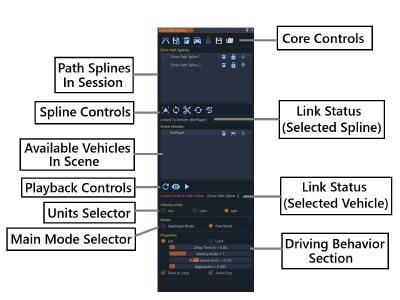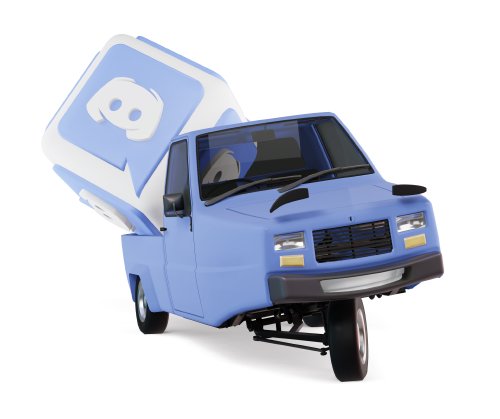Interface
Tool window layout
Main Tool Controls Section
The top row contains core operations:
- Add New Drive Path Spline: Creates a new drive path spline in the scene. The mouse cursor changes to purple, allowing the user to click on the map to place nodes and draw the driving path
- Import from PNG Mask: Loads drive paths from exported PNG mask files. Useful for importing previously created paths or sharing paths between sessions
- Remove All Drive Path Splines: Clears all drive path splines from the session. This action cannot be undone
- Toggle Velocities/Velocity Limits: Switches between velocity and velocity limit modes for the bar handles on splines. In velocity mode, the bars set exact speeds. In limit mode, they set maximum speed limits
- Tool Rigid Translation/Lock Toggle: Switches between free and rigid translation modes. Free mode allows normal movement, while rigid mode locks the spline for precise editing
- Save Session to Disk: Exports the current session to a JSON file, including all splines, vehicles, and their linking relationships
- Load Session from Disk: Imports a session from a JSON file, restoring the complete state of splines, vehicles, and links
Drive Path Splines Section
Spline List
- Session Management: Lists all drive path splines in the current session
- Individual Controls: Each spline row contains:
- Spline Name: Editable text field for the spline identifier
- Remove Spline Button: Deletes the specific spline
- Enable/Disable Toggle: Controls whether the spline is active
- Link/Unlink Button: Connects or disconnects the spline to/from the selected vehicle
Spline Operations Section
These buttons operate on the selected spline (highlighted in the list):
- Go to Spline: Moves the camera to focus on the selected spline, useful for navigating to distant paths
- Flip Spline: Reverses the spline direction (back to front), which also flips the velocity profile and vehicle start position
- Split Spline: Divides the spline at the selected node, creating two separate splines
- Simplify Spline: Reduces node count while preserving spline shape, useful for cleaning up complex paths
Link Status Display
Shows the current linking status of the selected spline:
- Linked: Displays the name of the vehicle the spline is connected to
- Unlinked: Shows that the spline is not connected to any vehicle
Scene Vehicles Section
Vehicle List
Each vehicle row contains:
- Vehicle Name: Identifier for the vehicle in the scene
- Remove Vehicle Button: Removes the vehicle from the scene
- Go to Vehicle Button: Moves the camera focus to the vehicle
- Link/Unlink Button: Connects or disconnects the vehicle to/from the selected path spline
Playback Controls Section
Control Buttons
- Refresh Vehicle List: Recomputes the list of available vehicles in the scene, useful after adding or removing vehicles outside the tool
- Toggle Spline Ribbon Visibility: Shows/hides the spline ribbons during playback, helping to visualize the driving path
- Play/Stop Toggle: Starts or stops AI driving along the selected path. The AI will follow the spline using the configured driving behavior
- Start/Stop Recording Vehicle: Records vehicle movement to create a new spline (only available when vehicle is not linked). Useful for capturing natural driving paths
Vehicle Link Status Display
Shows the current linking status of the selected vehicle:
- Linked: Displays the name of the spline path the vehicle is connected to
- Unlinked: Shows that the vehicle is not connected to any path
Mode Settings Section
Velocity Units Selection
Radio buttons to select velocity display units:
- m/s: Meters per second (default)
- mph: Miles per hour
- kph: Kilometers per hour
Main Mode Selection
Radio buttons for path creation mode:
- Free Mode: Default mode - draw paths anywhere on the map without restrictions
- NavGraph Mode: Uses existing navigation data to create paths which follow road networks
Properties Section
AI Driving Mode Control
- Set/Limit Radio Button: Controls the AI driving behavior
- Set: AI tries to maintain the exact speed specified in route speed
- Limit: AI uses route speed as an upper bound, allowing slower speeds when appropriate
Driving Behavior Parameters
Timing Controls
- Delay Time Slider: How long the AI waits before starting to drive (in seconds)
- Starting Node Index Slider: Which node on the path the AI begins from
Speed and Behavior Controls
- Route Speed Slider: Target speed for the AI
- Aggressiveness Slider: Driving style from conservative (0.3) to aggressive (1.0)
- 0.3: Normal everyday driving (shopping, commuting)
- 1.0: Driving at the limit of traction
AI Behavior Flags
- Drive in Lane Checkbox: When enabled, AI follows correct side of the road and respects road direction
- Avoid Cars Checkbox: When enabled, AI is aware of other vehicles and avoids collisions
Last modified:
September 15, 2025
Was this article helpful?

